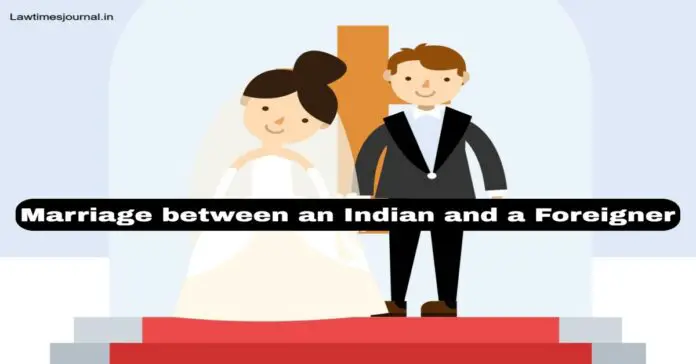
In India, marriage is treated as a sacramental union between two persons. The institution of marriage is strongly tied up with one’s religion. There are different statutes for the solemnization of marriage under different religions. However, the issue of rigid caste and religious barriers prevented couples to marry inter-caste or inter-faith. In 1954, the Indian Government enforced the Special Marriage Act. The act under Section 4 provides that “any two persons” can marry under the Special Marriage Act, 1954 Therefore, even a foreigner and an Indian can get their marriage registered under the aforementioned act.
The registration of marriage legally is significant to make a marriage valid and to avail legal conjugal rights related to that. A marriage between a foreigner and an Indian citizen will deem to be valid if it is registered under the Special Marriage Act, 1954. To register the marriage in India, the act states that the parties should give written notice to the Marriage officer wherein at least “one of the parties the marriage has resided for not less than thirty days immediately preceding the date on which such notice is given.”
After the submission of the notice of intention of marriage under Section 5 of the Special Marriage Act, the parties would require to submit the necessary paperwork and documents before the wedding day. These documents include:
1. Birth certificates (for age proof)
2. A valid visa of more than thirty days for the foreign national
3. A single-status affidavit signed by both parties.
4. Address proof and passport size photographs
5. Adequate documentary evidence of 30-day residence in India
6. A ‘no-objection letter – The foreigner has to get a ‘no-objection certificate’ from the respective embassy of his native country. To substantiate, to have a civil marriage ceremony between an Indian woman and an American man, the American man must submit a no-objection letter from US Embassy,
Once the marriage is solemnized, the marriage officer provides a certificate of marriage to the parties. This certificate is signed by the parties and three other witnesses. The certificate of marriage acts as evidence that the marriage between the two parties, in this case, a foreigner and an Indian has been solemnized under this act with all the required formalities.
Apart from the Special Marriage Act, 1954, marriage between a foreigner and an Indian can also be solemnized under the Foreign Marriage Act, 1969. After realizing the need for separate foreign marriage laws, the act was passed by the Indian Parliament. A foreign marriage can be solemnized under this act only if at least one of the parties to the marriage is a citizen of India. The legal age of the parties should be in case of the bride is eighteen and above and for bridegroom is twenty-one above, irrespective of the legal age to get married in the country of the foreigner party. The rules regarding the capacity of parties and conditions to marriage are similar to that of the Special Marriage Act, 1954. The FMA, 1969 is not to suppress any other provisions but is an additional provision. The Foreign Marriage Act is available to those citizens of India who are getting married to a foreigner or marrying outside India to get their marriage solemnized under the same.
The foreign party doesn’t need to apply for Indian citizenship to get married as per Indian laws. Further, if the couple is already legally married outside India, then the foreign marriage certificate is also acceptable. Based on the foreign marriage certificate, the parties can get their marriage registered.
References:
- The Special Marriage Act, 1954, No. 43, Act of Parliament (1954).
- The Foreign Marriage Act, 1969, No. 33, Act of Parliament (1969).
Edited By: Purnima Ojha








